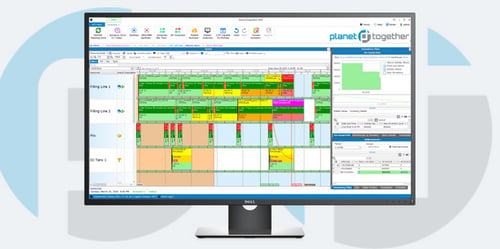Cybersecurity in Medical Manufacturing: Safeguarding Your Production Planning Systems
In the medical manufacturing environment, production planners play a pivotal role in ensuring efficient and seamless production. With the increasing reliance on advanced planning and scheduling (APS) systems like PlanetTogether, often integrated with enterprise resource planning (ERP) solutions such as SAP, Oracle, Microsoft, Kinaxis, or Aveva, cybersecurity has emerged as a critical concern. Cyber threats can disrupt production, compromise sensitive data, and lead to significant financial losses.
This blog explores the importance of cybersecurity in medical manufacturing, potential vulnerabilities, and best practices to protect production planning systems.

The Growing Cybersecurity Threat in Medical Manufacturing
The medical manufacturing sector is a prime target for cyberattacks due to its vast digital infrastructure and highly sensitive data. Cybercriminals often aim to disrupt production processes, steal intellectual property, or exploit regulatory vulnerabilities. As production planners rely on software-driven systems to optimize workflows, ensuring cybersecurity measures are robust and proactive is essential.
Some of the most common cyber threats facing medical manufacturers include:
Ransomware Attacks: Malicious software that encrypts critical files and demands a ransom to restore access.
Phishing Scams: Deceptive emails and messages designed to trick users into revealing credentials.
Data Breaches: Unauthorized access to confidential patient data, proprietary formulations, or production specifications.
Supply Chain Attacks: Exploiting vulnerabilities in third-party software or integrations to compromise production systems.
Vulnerabilities in Production Planning Systems
As medical manufacturing facilities integrate APS solutions like PlanetTogether with ERP platforms such as SAP, Oracle, Microsoft, Kinaxis, or Aveva, the complexity of cybersecurity risks increases. Some key vulnerabilities include:
Unsecured Integrations
Production planners benefit from real-time data exchange between PlanetTogether and ERP systems to optimize scheduling, inventory management, and resource allocation. However, unsecured API connections or weak encryption protocols can become entry points for cyber threats.
Outdated Software and Patch Management
Failing to update software regularly exposes planning systems to known vulnerabilities that hackers can exploit. Many cyberattacks target outdated systems that lack security patches.
Weak Access Controls
Production planners, IT teams, and other stakeholders access planning tools daily. Without stringent user authentication and role-based access, unauthorized personnel could manipulate production schedules, disrupt workflows, or steal proprietary data.
Lack of Network Segmentation
Interconnected systems streamline operations but can also increase risk. If an attacker gains access to one system, a lack of proper segmentation allows lateral movement, enabling them to reach sensitive planning data or disrupt production.

Best Practices to Strengthen Cybersecurity in Production Planning
To mitigate cybersecurity risks, production planners should adopt a proactive security strategy when using PlanetTogether integrated with ERP solutions. Implementing the following best practices can safeguard production planning systems against potential threats:
Implement Strong Authentication Measures
Multi-factor authentication (MFA) should be a standard security measure for accessing planning and ERP systems. Enforcing complex password policies and limiting user access based on job roles can reduce the risk of unauthorized access.
Regular Software Updates and Patch Management
Ensure that PlanetTogether, SAP, Oracle, Microsoft, Kinaxis, Aveva, and all related software systems are updated regularly. Automatic patch deployment and vulnerability scans can help address security gaps before cybercriminals exploit them.
Secure Integration Points
Since production planners rely on seamless data exchange between PlanetTogether and ERP platforms, it is essential to secure integration points. Using encrypted communication channels, API security measures, and regular vulnerability testing can help prevent cyber intrusions.
Monitor Network Activity
Deploying network monitoring tools and intrusion detection systems (IDS) can help identify suspicious activities in real time. Production planners should work with IT security teams to establish alerts for unusual login attempts, data transfers, or unauthorized access attempts.
Conduct Regular Cybersecurity Training
Human error is one of the leading causes of cybersecurity breaches. Providing ongoing training for production planners and manufacturing staff on recognizing phishing attempts, secure login practices, and data handling procedures can enhance overall security awareness.
Implement Backup and Disaster Recovery Plans
A robust backup and disaster recovery strategy ensures that production planners can quickly restore operations in case of a cyberattack. Regularly backing up critical production data and storing it in a secure, offsite location can minimize downtime and data loss.
Enforce Vendor Risk Management
Since many cyber threats originate from third-party vendors, manufacturers should assess the security protocols of software providers like PlanetTogether, SAP, Oracle, Microsoft, Kinaxis, and Aveva. Regular security audits and compliance checks ensure that vendor systems do not introduce vulnerabilities into the production planning environment.

The Role of IT and Production Planners in Cybersecurity
While IT teams manage overall cybersecurity, production planners must collaborate closely to ensure the security of planning and scheduling systems. Here’s how production planners can contribute:
Report Suspicious Activities: If a production planner notices discrepancies in scheduling data or unusual system behavior, immediate reporting to IT can prevent potential breaches.
Follow Security Policies: Adhering to IT security guidelines, including password protocols, device security, and access management, reduces the risk of cyber incidents.
Participate in Cybersecurity Drills: Regularly engaging in cybersecurity simulations and response drills prepares production teams to handle potential threats effectively.
As medical manufacturing continues to embrace digital transformation, production planners must recognize the growing importance of cybersecurity in protecting critical operations. The integration of PlanetTogether with ERP solutions like SAP, Oracle, Microsoft, Kinaxis, and Aveva brings significant efficiency gains, but also requires robust security measures to safeguard against cyber threats.
By implementing strong authentication, securing integrations, monitoring network activity, and fostering a cybersecurity-aware culture, production planners can play a crucial role in ensuring safe and uninterrupted manufacturing operations.
Are you ready to take your manufacturing operations to the next level? Contact us today to learn more about how PlanetTogether can help you achieve your goals and drive success in your industry.
Topics: PlanetTogether Software, Integrating PlanetTogether, Collaborative Cybersecurity, Medical Manufacturing, Cyber-Resilience Measures





















LEAVE A COMMENT